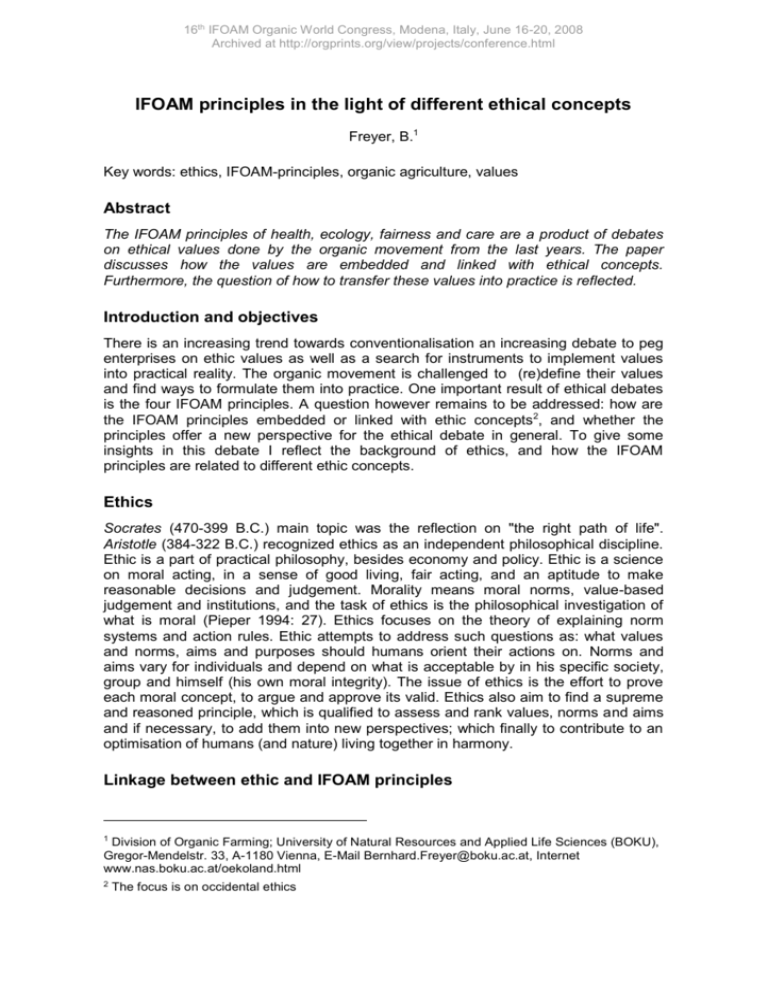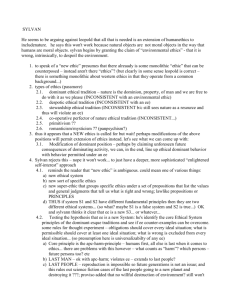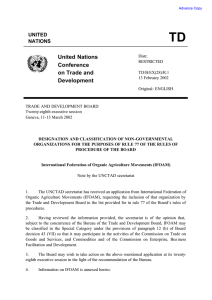
16th IFOAM Organic World Congress, Modena, Italy, June 16-20, 2008
Archived at http://orgprints.org/view/projects/conference.html
IFOAM principles in the light of different ethical concepts
Freyer, B.1
Key words: ethics, IFOAM-principles, organic agriculture, values
Abstract
The IFOAM principles of health, ecology, fairness and care are a product of debates
on ethical values done by the organic movement from the last years. The paper
discusses how the values are embedded and linked with ethical concepts.
Furthermore, the question of how to transfer these values into practice is reflected.
Introduction and objectives
There is an increasing trend towards conventionalisation an increasing debate to peg
enterprises on ethic values as well as a search for instruments to implement values
into practical reality. The organic movement is challenged to (re)define their values
and find ways to formulate them into practice. One important result of ethical debates
is the four IFOAM principles. A question however remains to be addressed: how are
the IFOAM principles embedded or linked with ethic concepts2, and whether the
principles offer a new perspective for the ethical debate in general. To give some
insights in this debate I reflect the background of ethics, and how the IFOAM
principles are related to different ethic concepts.
Ethics
Socrates (470-399 B.C.) main topic was the reflection on "the right path of life".
Aristotle (384-322 B.C.) recognized ethics as an independent philosophical discipline.
Ethic is a part of practical philosophy, besides economy and policy. Ethic is a science
on moral acting, in a sense of good living, fair acting, and an aptitude to make
reasonable decisions and judgement. Morality means moral norms, value-based
judgement and institutions, and the task of ethics is the philosophical investigation of
what is moral (Pieper 1994: 27). Ethics focuses on the theory of explaining norm
systems and action rules. Ethic attempts to address such questions as: what values
and norms, aims and purposes should humans orient their actions on. Norms and
aims vary for individuals and depend on what is acceptable by in his specific society,
group and himself (his own moral integrity). The issue of ethics is the effort to prove
each moral concept, to argue and approve its valid. Ethics also aim to find a supreme
and reasoned principle, which is qualified to assess and rank values, norms and aims
and if necessary, to add them into new perspectives; which finally to contribute to an
optimisation of humans (and nature) living together in harmony.
Linkage between ethic and IFOAM principles
1
Division of Organic Farming; University of Natural Resources and Applied Life Sciences (BOKU),
Gregor-Mendelstr. 33, A-1180 Vienna, E-Mail Bernhard.Freyer@boku.ac.at, Internet
www.nas.boku.ac.at/oekoland.html
2
The focus is on occidental ethics
16th IFOAM Organic World Congress, Modena, Italy, June 16-20, 2008
Archived at http://orgprints.org/view/projects/conference.html
The function of ethics is to strengthen the coexistence of humans, and encompasses
the well being of the individual and the community. This is also the overall aim of the
four IFOAM principles, based on the values of health, ecology, fairness and care have
been formulated as normative and ethical guidelines (Luttikholt 2007). The four
principles could be described as “moral norms for the behaviour of all stakeholders
who are part of the organic food chain system”. The idea is that at least all accept and
follow these principles and orient their actions towards them. All human beings who
are part of the system are responsible to fulfil these values (care). They should not
differentiate between human and nature but should consider all in totality (health;
wholeness and integrity of living systems) (IFOAM 2007). The principles are holistic in
a sense that they integrate the whole planet (space) as well as secure a future to
coming generations (fairness). Nevertheless humans become a specific focus of
attention (care). At least the values are concerned with associations of living systems
(ecology) and reintegration of any living being. The question is, how do these values
relate to ethical concepts?
Ethical concepts and IFOAM principles
The framework of the following reflections is given by the two concepts;
anthropocentric ethics and physiocentric ethics, with a selective focus on their specific
differentiations. In anthropocentric ethics, humans are on the top of the life pyramid
(impressed / res cogitans) in demarcation to the other world (material / res extensa)
(Descartes 1596-1650). Kant`s (1724-1804) Categorical Imperative “Act only
according to that maxim whereby you can at the same time will that it should become
a universal law”. It is in the tradition of anthropocentric ethics to follow the deontologic
ethics where an action is based on guiding principles rather than the
consequences of the action. This approach focuses on the rightness or wrongness
of actions themselves. Utilitarism excludes interests of plants and animals (Frey 1980)
but partial pathocentric ethic includes the interests of animals which are subject to
suffering (Bentham`s 1748-1832). Kant`s approach further includes the human
responsibility for animals, but he didn’t attributed to animals any rights or an own
value. This position is not in line with the IFOAM principles. In contrary Kant`s idea,
that ethical rules "bind you to your duty" (Waller 2005: 23) could be a perspective of
IFOAM principles.
Utilitarianism as one concept of consequentialism follows the idea that any action that
produces positive consequences is a morally right action, briefly, the ends justify the
means; or rather, the rightness of an action is determined by its consequences (Flew
1979: 73). There is a debate, if utilitarianism follows more a human centred, strong
anthropocentric, hedonistic and egoistic approach or more a responsible attitude, also
including the well being of society and nature as a whole (see Peet 1999; Daly 1995).
Egocentric ethic, based on ego, was developed in the 17th century, and came up with
nature-science revolution and the rise of capitalism. The fundamental issue is the
individual with his own interests, with the assumption that what is good for the
individual is also good for society. This position is mainly in conflict with several
interpretations of IFOAM principles, at least, because it follows the competition
approach of liberal economy. As a means to get out of this competitiveness, Hobbes
(1588-1679) recommended a contract of association between parties (Merchant 1991:
135). In this sense, the IFOAM principles are in agreement, as they offer a basis for a
contract between all stakeholders involved in the whole movement. Gradually,
modifications of anthropocentric ethics has systematically lead to physiocentric ethical
concepts (Pfordten 1996: 21). This ethical approach integrates ecosystems. Their
16th IFOAM Organic World Congress, Modena, Italy, June 16-20, 2008
Archived at http://orgprints.org/view/projects/conference.html
living and inanimate components are in the responsibility of human being (biocentrism,
holism, ecocentrism, pathocentrism). Biocentrism is a normative ethic which attributes
independent moral value to all living beings whereas the ecocentrism includes the
entire ecosystem. Moderate biocentrism means that we have to protect the whole
living nature and all forms of life are equally valuable and humans are not on the top of
the hierarchy of living organisms. Bentham represents the pathocentric ethic, where all
organisms which are able to suffer, are to be protected in a certain sense.
Zoocentrism integrates higher animals, a position often held by animal-rights-activists.
Albert Schweitzer (1875 - 1965) is the main representative of the radical biocentrism,
where every organism has the right to live and is to be protected. The most radical
position presents the holistic ethic, which accords the inanimate nature the same
rights as living organisms. At least all physiocentric ethics are not free of conflicts,
because there are several practical restrictions that limit their implementation into daily
practice. However, physiocentric ethics have some similarities with the IFOAM
principles, which includes all impacts of human acting on nature and try to respect,
protect the integrity of the living things and inanimate nature. Besides these general
orientations on ethical concepts, there are several disciplinary oriented ethics:
Bioethic – sustainable dealing with and use of nature
Social ethic (SE) – rights and duties of individual for other persons
Economy ethic (part of SE) –profitability and acting which include more than
self-interest
Science ethic – fairplay, incorruptibility
Peace ethic – exclusion of all destroying actions
IFOAM principles offer interfaces to all these ethics. The ecologic ethic (holistic
enviornmental ethic and other similar concepts) has an outstanding position in the
debate of IFOAM principles (see also the holistic environmental ethic; Birnbacher
1991; Jonas 1984; Meyer-Abich 1979). This concept includes the moral responsibility
for the whole environment (living and inanimate), the reverence for nature, the
categorical imperative to respect and protect higher animals, the minimization of
endangering future human existence, the conservation of natural and cultural
resources, the integration of future oriented aims of other human beings (subsidiary),
and the education to responsible actions. The moral concept of this ecocentric ethic is
the cosmos of the individual, human society and the whole environment. Also,
religious perspectives are part of this concept since comparable positions can be
found in nature religions. These concepts seem to be the main sources for the IFOAM
principles and guidelines. Nevertheless, the claim that these are transferable into daily
practices, are not without risks for the whole idea.
How to transfer the IFOAM principles into practice?
The task of ethics is not to stress ideologies or to impart any convictions (Pieper
1994). Following the reflections on biogenesis of Piaget, we can only talk about moral
understanding and behaviour, if those ethical orientations…”have not the character of
a compulsion from outside, but guarantee most of freedom for all members of a
community. Only a rule, which fulfil this objective, is a moral rule” (see Pieper 1994:
20). However, those engaged in organic agriculture are guided by the following
motivations:
If a farmer is heteronom, he is, as a sense of a duty following the organic
standards because he is interested in subsidies, higher prices and higher income
(see the ethical background: Pieper 1994: 18, 19)
16th IFOAM Organic World Congress, Modena, Italy, June 16-20, 2008
Archived at http://orgprints.org/view/projects/conference.html
Someone could also decide freely to fulfil the guidelines because he stands for
the values and realises that they meet his personal convictions and that of nature
and society as well
In the first case, to follow organic standards is a means to an end, where the IFOAM
principles are not focused, nor important for daily life. Whereas in the second case the
principles are the motivation to be an organic farmer. The mission of ethical norms is
to give orientation, without obliging, because it is the stakeholders’ own initiative to act
morally. Without this personal motivation and responsibility, standards and regulations
guided by ethical dimensions would not be significant to society. This is the challenge
for the organic movement as it searches to translate values into any type of standards
and guidelines.
Conclusions
The values presented with the four IFOAM principles have strong relations to
physiocentric ethics. Nevertheless, their position is to delineate and integrate
anthropocentric ethics and holistic environmental ethics. “Most ethicists agree that no
conclusions about general validity can be drawn from the actual existence of
standards. This would be a naturalistic fallacy” (Akademie der Wissenschaften, 1992;
Ott, 1999, in WBGU, 2001). At least, “ethical judgements refer to the justifiability of
moral instructions for action that may vary from individual to individual and from
culture to culture” (Ott, 1999). The IFOAM movement has to continue the debate,
following the principles of organic agriculture, to develop and modify their values, as a
result of open debates in different environmental, traditional cultural and societal
context. Finally, efforts in the education and training sector are important as they lead
to the practice of ethical values along the whole organic food chain.
References (further literature please contact the author)
Akademie der Wissenschaften (1992): Umweltstandards. Berlin: de Gruyter.
Birnbacher, D. (1991) (Hrsg.): Ökologie und Ethik, reclam Stuttgart.
Daly, H.E. (1995): Reply to Mark Sagoff`s “Carrying Capacity and ecological economics”
BioScience v 45 n 9 pp 621-624.
Flew, A. (1979): 'Consequentialism'. In A Dictionary of Philosophy, (2nd Ed.). New York: St
Martins: 73.
Frey, R. G. (1980): Interests and Rights. The Case Against Animals. Oxford 1980.
Jonas, H. (1984): Das Prinzip Verantwortung - Versuch einer Ethik für die technologische
Zivilisation, Frankfurt/Main 1984.
Merchant, C. (1991): "Entwurf einer ökologischen Ethik". In: H.-P. Dürr, W.Ch. Zimmerli (1991)
(Hrsg.): Geist und Natur. Scherz Verlag, München, 416 S.
Meyer-Abich, K.M. (1979)(Hrsg.): Frieden mit der Natur, Freiburg i.B. 1979.
Ott, K. (1999): Zur ethischen Bewertung von Biodiversität. Externes Gutachten für den WBGU.
Unveröffentlichtes Manuskript.
Pfordten, D. von der (1996): Ökologische Ethik. Zur Rechtfertigung menschlichen Verhaltens
gegenüber der Natur. Reinbek: Rowohlt.
Pieper, A. (1994): Einführung in die Ethik. Francke Verlag Tübingen und Basel, 294 S.
Waller, B. N. (2005): Consider Ethics: Theory, Readings, and Contemporary Issues. New York:
Pearson Longman: 23.










